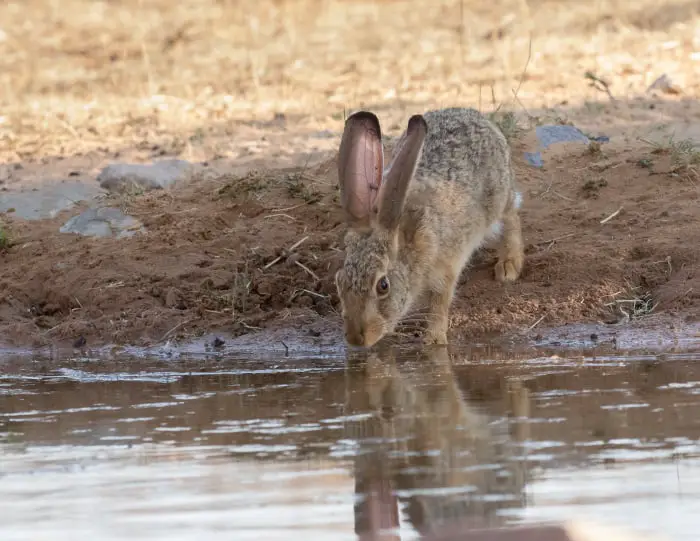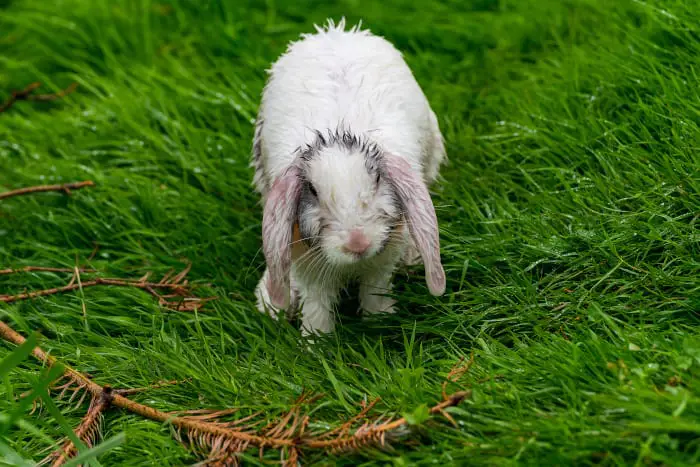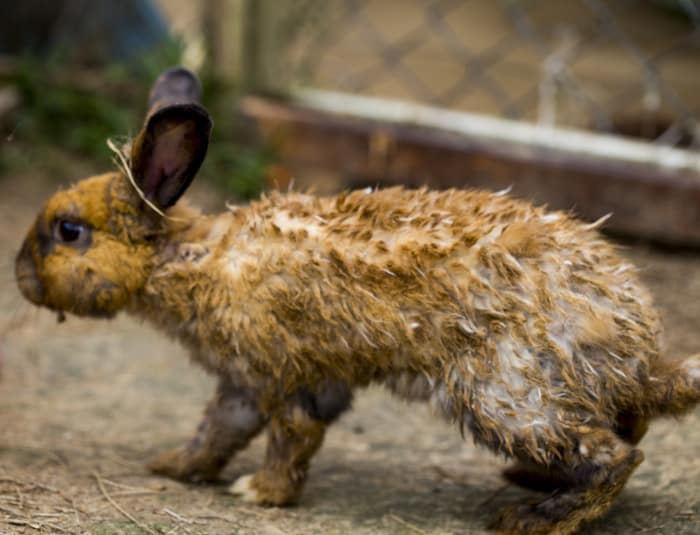When we think of rabbits, we imagine those shy, furry creatures that spend a good part of their lives jumping from one place to another or hiding fearfully in a burrow. But not many of us would have ever imagined that little rabbit swimming.
Today we can find countless videos that show these creatures seemingly “enjoying” a sunny day in a pool. It is then that we become astonished and ask ourselves: Can rabbits swim?
There are many discrepancies as to the appropriate answer to this question. While many people might say that they can, many others claim that it is not possible. In the face of this disagreement, perhaps it would be better to distinguish among two different things; that is to say, one thing is to ask if rabbits can swim, while another is to ask if rabbits like to swim.
Can Rabbits Swim?
Technically speaking, rabbits can swim, but this is not the norm. Like many other rabbit behaviors, swimming is a basic survival instinct.
Rabbits develop this ability between 8 and 15 days of age. They take advantage of their morphology for this purpose. Their light bones allow them to float, and the powerful muscles of their front and hind legs help them to propel themselves through the water.
However, that doesn’t mean that swimming does any good for them. A rabbit’s body, as well as its nervous system, is too fragile. In most circumstances, swimming can result in severe consequences for the rabbits.
Are There Breeds of Rabbits That Can Swim More Than Others?
All rabbits can swim. We could say that swimming is an inherent skill of rabbits, but they use it rarely. They use this ability, especially when they are in danger, and have no other choice. This is particularly true for rabbits in the wild.
So-called swamp rabbits are quite skilled when it comes to swimming. Swamp rabbits size gives them increased buoyancy and musculature to be great swimmers. They do it for survival purposes: to evade predators, find food and mates. Swamp rabbits swim only for survival and not for recreational purposes.
The skeleton and muscles of a rabbit allow it to swim efficiently, but these animals usually reserve this activity for life or death escapes. This instinct could arise when fleeing from a predator.

What About My Pet Rabbit?
Despite having the ability to swim, rabbits do not enjoy diving into the water. Rabbits are afraid of water. The fact that your rabbit can swim doesn’t mean it likes to do so. What might seem relaxing to us, for them is nothing more than a stressful situation, where all they can think about is not drowning. They just don’t enjoy it.
Theis bodies are so fragile that even a small bath could be traumatic and dangerous enough to cause them to go into shock and even die.
Pet rabbits don’t need to swim. The only source of water they need is the one they can drink. For them, water is terrifying in large quantities. Their little bodies are overwhelmed by being immersed in something so cold and humid. It stresses them out in such a way that they could be seriously injured or even killed.
What Are The Consequences?
Rabbits are very delicate animals. They have highly vulnerable anatomy and nervous system. So one must avoid exposing them to extreme situations. What might seem to be a fun activity, in reality, can have serious consequences for our pets. The following are some of these terrible consequences:
They Can Be Panicked
The fear that rabbits experience when submerged in water can be overwhelming. When suddenly diving into the water, a rabbit may panic. In this state of panic, it is easy for them to be overcome by water and drown.
When a rabbit steps into the water, its movements become limited, which means that it cannot jump as usual. This feeling fills them with anxiety and stress.
Paralyzing anxiety can cause a shock to their system, and in extreme cases, even a heart attack. Even a simple full-body bath could be fatal.
Problems With Their Skin and Fur
Rabbits have very delicate skin and very dense fur. Because the bodies of rabbits are so gentle and furry, it takes quite a while to dry out after getting wet. A bunny’s coat will not dry off so quickly when it gets wet. A wet rabbit can take twice as long to dry than it would take a dog. A wet coat can cause many problems for the health of your rabbit:
- Rabbit skin is extremely fragile. Any excess in moisture can significantly increase the risk of tearing. Skin tearing can, in turn, be the focus of severe bacterial infections.
- The rabbit’s average temperature is 38-39C. The fur of a rabbit should not remain wet for long. If so, it can cause a quick drop in its body temperature, which leads to hypothermia. Hypothermia is a common cause of shock in rabbits. Rabbits usually do not recover from such trauma.
- A sudden drop in body temperature can also contribute to developing respiratory infections like pneumonia. Respiratory illnesses can be exacerbated if the bunny inhales water while swimming. Rabbits have small lungs. Swallowing substantial amounts of water is dangerous and could result in respiratory infections.
- Their hair absorbs a lot of water, which results in weight gain. So for a wet rabbit, it will be much more difficult and exhausting to be able to swim.
Now you know the implications and issues which can arise from keeping your rabbit’s coat wet. So, to avoid problems, if your rabbit ever gets wet, make sure you dry it quickly.

Water Contaminants
Pool water, as well as natural water sources, can pose many problems for your pet:
Water from swimming pools contains high quantities of chemical substances, like chlorine, which are not suitable for rabbits. Your rabbit’s health may be affected if it comes into contact with these substances.
Remember that the skin of your bunny is very delicate and vulnerable. These substances will probably end up irritating their skin and could make them very sick if these substances get into their eyes, nose, or mouth. Chlorine from swimming pools can cause asthma and sinusitis in your rabbit.
Water sources in the wild, on the other hand, can contain parasites, bacteria, and other hazards to your rabbit.
Ear Infections
Rabbits are naturally prone to infection because of the length of their ears. The condition can be worse if water gains access into their ear canal. An increase in humidity in the ear canal will lead to the development of bacteria prone infections and otitis.
Gastrointestinal Stasis
Submerging a rabbit in water is not advisable as this can be quite stressful for the animal. Forcing a rabbit to swim can be extremely traumatic for the animal and can put their lives in danger.
For the vast majority of rabbits, stress causes changes that affect their digestive system. Shock can trigger a fatal gastrointestinal stasis or what is worse a cardiac arrest. Many rabbits have died from this type of trauma.
Is It Recommended to Bathe a Rabbit?
Rabbits don’t require bathing. Bunnies are extremely clean creatures. They love to groom themselves thoroughly every day, but they don’t like to be bathed.
Bathing stresses them terribly and exposes them to injury as they try to resist and escape. So, trying to bath your bunny leads to completely unnecessary stress. Also, rabbits are very vulnerable to cold and damp.
What If My Rabbit Gets Really Dirty?

In case it gets dirty, you can wipe then clean with a wet washcloth, pet wipes, or you can give a dry bath with a cornstarch based powder.
Sometimes the rear of your rabbit can become extremely dirty or wet if it has soft stools or is wet with urine. If this happens, it will be necessary to wash its rear end as the accumulation of feces and urine can cause the skin underneath to become very painful and irritated.
For this purpose, you can immerse the rear of your rabbit in some warm water with great caution. Rabbits can quickly get hypothermic, so you must dry them quickly and avoid ever soaking the entire animal in the water.
You can help yourself with a hairdryer on a low-temperature setting if the noise does not frighten them. You may also use towels, but please make sure they get thoroughly dry.
To sum up, a rabbit could swim in nature if it had to, but it probably wouldn’t choose to do so unless there was no other option. This behavior only occurs when they feel threatened, and it is necessary to escape from a predator.
Pet rabbits do not need to swim. Don’t forcefully expose them to water or force them to swim, because rabbits are very delicate creatures and such activities are too stressful for these creatures. Trying to force them to swim could be listed as a type of animal abuse and neglect.
When we agree to host a pet in our home, we should not do it for the simple fact that it will be fun for us. We must act responsibly and commit ourselves to provide them with food and cares, protecting them from any danger, and above all respecting them.


Thanks for sharing.